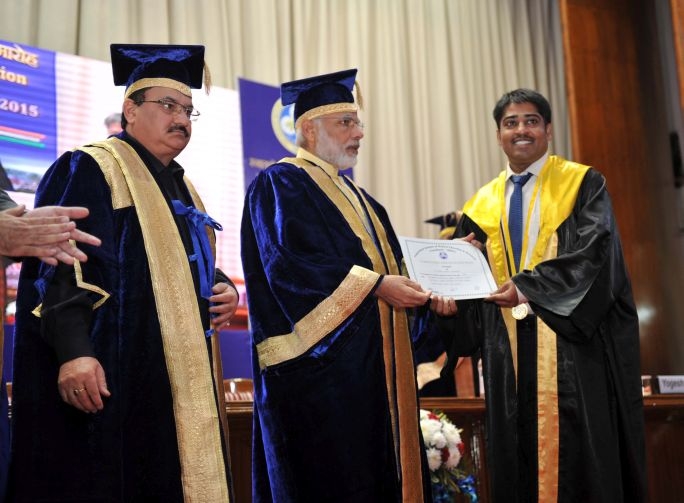Friday, January 8, 2016
Non-bailable warrant against MS Dhoni in controversial magazine cover issue
A non-bailable warrant was issued by the Anantpur court on Friday against Indian cricketer MS Dhoni for a controversial magazine cover in 2013 showing him as Hindu god, Vishnu. According to reports, India’s limited-overs skipper has been asked to be present in court on 25th February.
Jayakumar Hiremath, a social activist, claimed Dhoni had hurt Hindu sentiments in 2013 for being on the magazine cover of Business Today where he was depicted as Vishnu holding a shoe among other products he was endorsing. After the complaint, a case was registered under section 295 and 34 of the Indian Penal code.
Saturday, December 19, 2015
Wednesday, December 16, 2015
Friday, September 11, 2015
Prime Minister Narendra Modi addressing the 34th Convocation Ceremony of PGIMER, Chandigarh on Friday
The Prime Minister inaugurated a new housing scheme and addressed a public meeting at Sector-25, Chandigarh. He was felicitated by ex-servicemen on stage
Noting the presence of children from nearby Government schools at the function, the Prime Minister said that they were the real chief guests of the occasion ...
Prime Minister Narendra Modi addresses the 34th Convocation Ceremony of PGIMER, in Chandigarh on Friday
PGIMER Graduates get a 9/11 lecture from NaMo
Tuesday, April 14, 2015
B. R. Ambedkar
Bhimrao Ramji Ambedkar (Marathi: भीमराव रामजी आंबेडकर) ([bʱiːmraːw raːmdʑiː aːmbeːɽkər]; 14 April 1891 – 6 December 1956), popularly known as Babasaheb, was an Indian jurist, economist, politician and social reformer who inspired the Modern Buddhist Movement and campaigned against social discrimination against Dalits, women and labour. He was Independent India's first law minister and the principal architect of theConstitution of India.
Early life and education
Ambedkar was born in the town and military cantonment of Mhow in the Central Provinces (now in Madhya Pradesh).[16]He was the 14th and last child of Ramji Maloji Sakpal, a ranked army officer at the post of Subedar and Bhimabai Murbadkar Sankpal. His family was of Marathi background from the town of Ambavade (Mandangad taluka) inRatnagiri district of modern-day Maharashtra. Ambedkar was born into a poor low Mahar (dalit) caste, who were treated as untouchables and subjected to socio-economic discrimination. Ambedkar's ancestors had long been in the employment of the army of the British East India Company, and his father served in the British Indian Army at the Mhow cantonment.
Belonging to the Kabir panth, Ramji Sakpal encouraged his children to read the Hindu classics. He used his position in the army to lobby for his children to study at the government school, as they faced resistance owing to their caste. Although able to attend school, Ambedkar and other untouchable children were segregated and given little attention or assistance by the teachers. They were not allowed to sit inside the class. Even if they needed to drink water, someone from a higher caste would have to pour that water from a height as they were not allowed to touch either the water or the vessel that contained it. This task was usually performed for the young Ambedkar by the school peon, and if the peon was not available then he had to go without water; the situation he later in his writings described as "No peon, No Water". He was required to sit on a gunny sack which he had to take home with him.
Ramji Sakpal retired in 1894 and the family moved to Satara two years later. Shortly after their move, Ambedkar's mother died. The children were cared for by their paternal aunt, and lived in difficult circumstances. Three sons – Balaram, Anandrao and Bhimrao – and two daughters – Manjula and Tulasa – of the Ambedkars would go on to survive them. Of his brothers and sisters, only Ambedkar succeeded in passing his examinations and graduating to a high school. His original surname Ambavadekar comes from his native village 'Ambavade' in Ratnagiri district.[ His Brahmin teacher, Mahadev Ambedkar, who was fond of him, changed his surname from 'Ambavadekar' to his own surname 'Ambedkar' in school records
Monday, April 6, 2015
New Gionee Elife S7 comes to India, company hiring for its local R&D team
Gionee Elife S7 specifications:
Display: 5.2-inch 1080 x 1920p w/ Corning Gorilla Glass 3
OS: Android 5.0-based Amigo 3.0
Processor: 64-bit MediaTek SoC 1.7GHz octa core CPU
Graphics: Mali-T760MP2
Memory: 2GB RAM, 16GB internal memory, no microSD card slot
Camera: 13MP rear camera w/ LED flash and auto focus, 8MP front camera
Connectivity: Dual SIM, 3G, Bluetooth 4.0, Wi-Fi, A-GPS, USB OTG
OS: Android 5.0-based Amigo 3.0
Processor: 64-bit MediaTek SoC 1.7GHz octa core CPU
Graphics: Mali-T760MP2
Memory: 2GB RAM, 16GB internal memory, no microSD card slot
Camera: 13MP rear camera w/ LED flash and auto focus, 8MP front camera
Connectivity: Dual SIM, 3G, Bluetooth 4.0, Wi-Fi, A-GPS, USB OTG
Subscribe to:
Comments (Atom)















